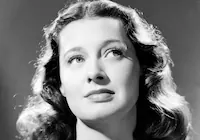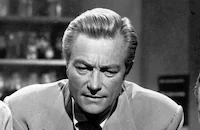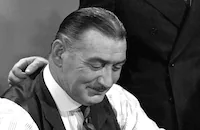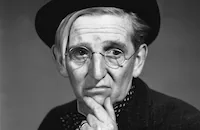Ice-Capades Revue
Cast & Crew
Bernard Vorhaus
Ellen Drew
Richard Denning
Jerry Colonna
Barbara Jo Allen
Harold Huber
Film Details
Technical Specs

Synopsis
At her Middlebury, Massachusetts farm, Ann Porter receives a telegram stating that her deceased uncle Jonathan has willed his entire estate to her, and she and her aunt Nellie rush to Manhattan to collect what they assume is a fortune vast enough to save their failing farm. Instead, they discover that the whole inheritance consists of a bankrupt ice skating production starring a Czechoslovakian champion. When Jefferson "Jeff" Stewart suggests that Ann sell the show to his friend, Duke Baldwin, she is overjoyed until the show's cast tells her that Jeff works for Duke, an ex-gangster who had ruined her uncle with a competing show and a monopoly on all the ice rink venues. As the plucky players demonstrate their skills for Ann, Nellie visits the Empire State Building, where she meets an eccentric astronomer named Theophilus J. Twitchell, who promises to back the ice show as soon as he collects his fortune the next month. When Ann hears about Twitchell, she decides to bring the whole troupe to her farm to practice on her pond. That night, she surprises Jeff and Duke, who expect to seal their deal with ease, by showing up dressed as a sophisticated urbanite and telling them she will not sell the troupe. Days later, the troupe is practicing at the farm when Jeff purposefully crashes his car in front of the house so he will have to be invited in. Ann, grasping his ploy, sets both his arms in casts and then throws him out. As he wanders in the woods, Jeff meets Twitchell, who decides that Jeff, as a Scorpio, is a lucky charm and cannot leave his side. Ann reluctantly allows him to stay as a handyman, and in the following weeks, he pitches the idea of selling her show to a revue called Frozen Follies. Soon, the skaters begin to demand a good director and the store cancels their credit, but Ann impresses Jeff with her continued optimism, and they manage to stage a small show on the pond. All the neighbors love it and, thanks to Jeff's marketing skills, they earn some money. Ann forgives Jeff and they produce the Porter/Stewart Ice Extravaganza together, a big show which piques the interest of venue owner Gabby Raskoff. Duke, however, also comes to watch the show when it is finished, and when he tells Ann that Jeff has promised the show to his Frozen Follies revue, she will not believe Jeff's claim that he recently quit working for Duke because he fell in love with her. She turns to Twitchell for his backing, but he reveals that his "fortune" will come from a radio contest he hopes to win. Jeff overhears and, after quickly rigging the radio signal, announces that Twitchell has indeed won the contest, and backs the troupe himself without anyone's knowledge. When the show goes on in New York, it is a huge success and promises to puts Duke out of business. At the last minute, however, Duke announces that he had provided the show's costumes and scenery but now wants them back. Ann, Jeff, Nellie and Twitchell work frantically to prevent Duke's goons from stealing all the equipment, and after they succeed, Raskoff buys the production. Nellie then convinces Twitchell to marry her, as Jeff and Ann kiss.

Director
Bernard Vorhaus
Cast

Ellen Drew

Richard Denning
Jerry Colonna
Barbara Jo Allen

Harold Huber
Marilyn Hare
Bill Shirley

Pierre Watkin
Si Jenks
Sam Bernard
George Byron
Vera Hruba
Megan Taylor
Lois Dworshak
Donna Atwood
Dench & Stewart
Jackson & Lynam
"red" Mccarthy
Phil Taylor
Joe Jackson Jr.
Eric Waite
Robin Lee
The Benoits
Babs Savage
Charles Williams
William Newell

Edward Keane
Roy Butler
Harrison Greene
Broderick O'farrell
Cy King

Jimmy Conlin

Mary Mccarty
Betty Farrington
Elmer Jerome
Hal Price
Lee Shumway
Stanley Blystone
George Sherwood
Edwin Stanley
Dave Willock
Frank Jaquet
Beatrice Maude
Kathryn Sheldon
Emil Van Horn
Jack Norton
Irene Shirley
Frank Brownlee
Crew
John Alton
George Blair
Robert Crawford
Ken Darby
Al Goodhart
Mauri Grashin
Edmund L. Gruber
Russell Kimball
Charles E. King
Harry Losee
R. Lovell
Sol Meyer
Alfred Hart Miles
Robert North
Jacques Offenbach
Adele Palmer
Gertrude Purcell
Thomas Richards
Allan Roberts
Bradford Ropes
Walter Scharf
Walter Scharf
Robert T. Shannon
Otto Siegel
Marlin Skiles
Jule Styne
Kay Twomey
Charles A. Zimmerman

Film Details
Technical Specs

Articles
Ellen Drew, 1914-2003
She was born Esther Loretta "Terry" Ray on November 23, 1914, in Kansas City, Missouri. The daughter of a barber, her family moved to Chicago when she was still an infant and she lived a very quiet childhood far removed from the glamour of Hollywood. She was encouraged by some friends to enter a beauty contest when she was just 17. After winning, she tried her luck in Hollywood, but found that they were no immediate offers for her particular talents.
She eventually took a waitressing job at C.C. Brown's, a famed Hollywood Boulevard soda fountain, and had virtually abandoned her dreams as a starlet when William Demarest, a popular actor's agent and well-known character actor, spotted her. Demarest arranged a screen test for her at Paramount, and she was promptly placed under contract for $50 a week.
For the first few years, (1936-38), Drew got only bit parts, and was often uncredited. When she finally got prominent billing in the Bing Crosby musical Sing You Sinners (1938), she decided to change her name, from Terry Ray to Ellen Drew. She earned her first major role in Frank Lloyd's If I Were King (1938) opposite Ronald Colman, yet for the most part of her career, rarely rose above "B" material and second leads. Still, she had some fine exceptions: Preston Sturges' enchanting comedy Christmas in July (1940), with Dick Powell; Tay Garnett's lighthearted war romp My Favorite Spy (1942) co-starring Kay Kyser; Julien Duvivier's taut The Imposter (1944), holding her own with a brooding Jean Gabin; and Mark Robson's chilling low-budget chiller Isle of the Dead (1945) opposite Boris Karloff. Drew made some notable television appearances in the late '50s including Perry Mason and The Barbara Stanwyck Show, before retiring from the entertainment industry. She is survived by her son David; five grandchildren; and five great-grandchildren.
by Michael T. Toole

Ellen Drew, 1914-2003
Quotes
Trivia
Notes
The working titles of this film were Ice-Capades of 1942 and Ice Capades Revue of 1943. The viewed print was a 1949 re-edited and re-released version, entitled Rhythm Hits the Ice. In the onscreen credits, Barbara Jo Allen is listed as "Barbara Jo Allen (Vera Vague)." Vera Vague was Allen's radio character name. Ellen Drew was borrowed from Paramount for this role, and Vera Hruba Ralston was signed to a seven-year contract with Republic immediately following the film. Ice-Capades Revue was designed as a follow-up to the successful 1941 film Ice-Capades; and both pictures capitalized on the popular touring ice show of the same name.














